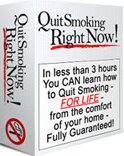 |
|
Baby your Baby and Nix the Nicotine.
Getting Pregnant. If you currently use oral contraceptives and smoke, you are at a greater risk for cardiovascular diseases and high blood pressure. Female smokers have only 72 percent of a nonsmoker’s fertility. Likewise, male smokers face a 50 percent higher risk of becoming impotent. Research shows that smoking may decrease ovulatory response and impair the fertilization and implantation of the zygote. It is also believed that tobacco chemicals may cause the cervical fluid to become toxic to sperm, which greatly increases difficulty in conceiving. It has also been argued that toxic chemicals in cigarettes may cause gene mutations, which could result in birth defects, cancer, miscarriages, and a myriad of other health problems for children of smokers. These gene mutations would affect babies whose fathers are smokers—not just the mothers. During Pregnancy and Childbirth. During pregnancy, tobacco chemicals are passed from a mother who is a smoker to the fetus through the bloodstream. These chemicals, toxic to both mother and child, present serious risks. Studies have shown that smoking during pregnancy is associated with numerous health problems, including low birth weight, placenta previa, premature delivery, premature membrane rupture, miscarriage, and neonatal death. If a newborn has a mother who smoked during pregnancy, that child’s nicotine levels in the bloodstream will be equal to that of the mother. In the first few days after birth, the child of a smoking mother will suffer from withdrawal symptoms. After Birth. After the baby is born, the baby’s health continues to be affected by a smoking mother or father. During its first year, a baby with parents who smoke will experience higher risk of pneumonia and bronchitis. Babies of smokers are also at increased risk of frequent, severe asthma attacks. Children exposed to secondhand smoke (passive smoking) are more susceptible to its ill effects because of their increased breathing rate. Secondhand smoke can cause children to have more colds, respiratory problems, ear aches, and sicknesses requiring a physician’s care. Asthma or allergies can be made more severe when children are exposed to secondhand smoke. Eventually, children of smokers are at a greater risk of becoming regular smokers themselves. How to Quit. Once you have made the decision to quit smoking and ensure a healthier future for yourself and your child, the benefits begin almost immediately. Twenty minutes after your last cigarette, your blood pressure and pulse rate return to normal. Within the first three days, carbon dioxide and nicotine is eliminated from the system, your energy levels increase, and breathing becomes easier. A year after quitting an ex-smoker’s circulation will be improved, and lung functions increased. Ten years after quitting, the risk of lung cancer is 50% that of a smoker and risk of a heart attack is equal to that of a nonsmoker. Even knowing all of its benefits, though, is not always enough to make quitting a feasible goal. Smokers who have successfully kicked the habit suggest several ways to cope with the difficult process of breaking a nicotine addiction. First of all, make a list of reasons why to quit. As someone who is pregnant or thinking of becoming pregnant, the health of your baby will be at the top of your list. This is a great opportunity to stop making excuses and motivate your self to quit in a specific time frame. Other reasons may include your health and well being, financial concerns, or even improved appearance and getting rid of the distinctive smell of tobacco. Whenever you are tempted to start smoking again, take out your list and remind yourself why you’d rather quit. Another tried-and-true technique is to surround your self with support. Tell friends and family about your intention to quit and ask them for encouragement and patience throughout the process. Join support groups formed specifically for people that are quitting smoking. Both online and local groups are available, depending on your preference for in-person contact or 24/7 advice. Many groups such as the American Lung Association or the American Cancer Society will help you find support groups or offer online support. Another good place to look for support is to your health or insurance provider. If you smoke before, during, or after becoming pregnant, you put both your health and the health of your baby at risk. If you quit smoking, however, the benefits begin only 20 minutes after your first cigarette and continue for years to come. Ensure a healthy start for your baby by quitting smoking today! Wake Up Richer Every Morning... Instant Internet Business Makes Money Automatically... Thomas Hunter is an Internet marketer, author and publisher and has helped hundreds of people become successful Niche Marketers. Explore the highly profitable world of Niche Marketing at http://SixFigureNiches.com our popular website. Article Source: http://netsalesinc.com If you have a website or ezine you may freely post this article on your site as long as you include the full resource box above. All links must be active / clickable with no syntax changes.
| |
